
David Bartholomew
*David Bartholomew was born on this date in 1918. He was a Black musician, bandleader, composer, arranger, and record producer.
David Louis Bartholomew was born in Edgard, Louisiana, to Mary and Louis Bartholomew. He learned to play his father's preferred instrument, the tuba and then took up the trumpet, which Peter Davis taught him, who had also tutored Louis Armstrong.
Around 1933, Bartholomew moved with his parents to New Orleans, where he played in local jazz and brass bands, including Papa Celestin and Fats Pichon's band on a Mississippi riverboat. He took charge of Pichon's band in 1941 and joined the US Army during World War II after playing in Jimmie Lunceford's band. As a 196th Army Ground Forces Band member, he developed writing and arranging skills. Bartholomew married Pearl King in 1942. After she died in 1967, he married Rhea (née Rouse). He had three sons and two daughters.
At the war's end, Bartholomew returned to New Orleans and, by November 1945, had started leading his dance band, Dave Bartholomew and the Dew Droppers, named after a now-defunct local hotel and nightclub, the Dew Drop Inn. The band became locally popular in 1947 and was invited by club owner Don Robey to perform in Houston, Texas, where Bartholomew met Lew Chudd, the founder of Imperial Records. Bartholomew and his band made their first recordings, including "She's Got Great Big Eyes," later that year.
Their first hit, "Country Boy," reached number 14 on the national Billboard R&B chart in early 1950. Prominent members of the band, besides Bartholomew on trumpet and occasional vocals, were the saxophonists Alvin Tyler, Herb Hardesty, and Clarence Hall, the bass player Frank Fields, the guitarist Ernest McLean, the pianist Salvador Doucette, and the drummer Earl Palmer. They were later joined by the saxophonist Lee Allen.
Two years after they had first met in Houston, Lew Chudd asked Bartholomew to become Imperial's A&R man in New Orleans. He produced Imperial's first national hits, "3 x 7 = 21", written by him and recorded by Jewel King, and "The Fat Man," recorded in December 1949 by a young pianist, Fats Domino. "The Fat Man" was based on the drug-themed "Junker's Blues," with lyrics rewritten by Bartholomew and Domino to attract a wider audience, reached number 2 on the R&B chart, and eventually sold over one million copies, jump-starting Domino's career.
Both records featured Bartholomew's band, as did a succession of further hits through the 1950s. Bartholomew's "genial, steady-rolling arrangements" contributed to the music's success. Bartholomew left Imperial for two years and recorded for Decca, King, and Specialty. Among his recordings at King was "My Ding-a-Ling" in January 1952; the song was later recorded by Chuck Berry, who had an international hit with it in 1972. While at Specialty, Bartholomew produced Lloyd Price's recording of "Lawdy Miss Clawdy," which featured Domino on piano. The single reached number 1 on the R&B chart in mid-1952.
Bartholomew returned to Imperial to work again on Domino's recordings, co-writing and producing a series of R&B hits for him. Domino's crossover to the pop chart came in 1955 with "Ain't That a Shame." Further hits followed through the late 1950s and early 1960s: "I'm in Love Again" and "Blue Monday" (both in 1956), "I'm Walkin'" (1957), "I'm Gonna Be a Wheel Someday" (1959), "Let the Four Winds Blow" (1961) all co-written and produced by Bartholomew and "Blueberry Hill" (1956) and "Walking to New Orleans" (1960), also directed by Bartholomew.
Over the same period, Bartholomew wrote, arranged, and produced recordings by many other Imperial artists, including Smiley Lewis, the Spiders, Chris Kenner, Earl King, Tommy Ridgley, Robert Parker, T-Bone Walker, Roy Brown, Frankie Ford, Shirley and Lee. Other musicians later covered several of Bartholomew's songs. On several of his songs, his wife, Pearl King, received a co-writing credit.
After Imperial was sold to Liberty Records in 1963, Bartholomew remained in New Orleans. He worked for Trumpet Records and Mercury Records and established his label, Broadmoor Records, in 1967. In the 1970s and 1980s, Bartholomew led a traditional Dixieland jazz band in New Orleans, releasing an album, Dave Bartholomew's New Orleans Jazz Band, in 1981. He also took part in Fats Domino's international tours during that period. He was inducted into the Rock and Roll Hall of Fame as a nonperformer in 1991.
He released two more albums in the 1990s, Dave Bartholomew and the Maryland Jazz Band (1995) and New Orleans Big Beat (1998), and he continued occasional appearances with his band at festivals. David Bartholomew, prominent in the music of New Orleans throughout the second half of the 20th century, died of heart failure at East Jefferson General Hospital in Metairie, Louisiana, on June 23, 2019.